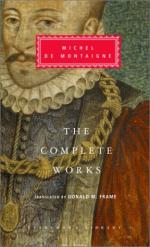
|
| Name: _________________________ | Period: ___________________ |
This test consists of 15 multiple choice questions and 5 short answer questions.
Multiple Choice Questions
1. What language was this book originally written in?
(a) Latin.
(b) French.
(c) English.
(d) German.
2. Montaigne says that he could never do what with respect to his father?
(a) Disobey him.
(b) Forget him.
(c) Deny him.
(d) Speak poorly of him.
3. In one of Montaigne's stories about mercy, what position does Conrad hold?
(a) General.
(b) Emperor.
(c) Captain.
(d) King.
4. In Book 1 of Essays: Chapter 3, Essay #48, Montaigne discusses an unusual rule instituted by knights of what nation?
(a) Germany.
(b) France.
(c) Spain.
(d) Italy.
5. Montaigne's father asked him to translate the unusual book discussed in Book 2 of Essays: Essay #12 into what language?
(a) Spanish.
(b) Latin.
(c) Italian.
(d) French.
6. Montaigne says that a fabricated storyline must be what?
(a) Unremarkable.
(b) Predictable.
(c) Consistent.
(d) Ordinary.
7. What subject does the second introduction for this book cover?
(a) Montaigne himself.
(b) The history of Europe.
(c) Translation issues.
(d) Philosophy in general.
8. What decision does Conrad make in one of Montaigne's stories about mercy?
(a) To let the women and children go.
(b) To forgo a series of executions.
(c) To let the defeated enemy leader live.
(d) To release every tenth prisoner.
9. What was Montaigne's father's opinion on education?
(a) He dismissed it.
(b) He thought it was too expensive.
(c) He thought it was only for the middle class.
(d) He valued it.
10. At the time that Montaigne was engaged in his translation of the unusual book, what philosophy was gaining significant popularity?
(a) Lutheranism.
(b) Calvinism.
(c) Empiricism.
(d) Predestination.
11. In Montaigne's story about the man leading a large number of troops, what moves the man to act with mercy?
(a) Children praying for mercy.
(b) Monks praying in a church.
(c) Three holdouts fighting bravely.
(d) A group of women about to kill themselves.
12. Montaigne recommends that men not marry until they reach what age?
(a) 40.
(b) 34.
(c) 30.
(d) 25.
13. While Montaigne was in office in Bordeaux, what system experienced major problems?
(a) The highway system.
(b) The sewage system.
(c) The aqueduct system.
(d) The canal system.
14. What creature dose Montaigne discuss near the end of Book 2 of Essays: Chapter 7, Essay #12?
(a) The mole.
(b) The hedgehog.
(c) The rat.
(d) The raccoon.
15. Montaigne characterizes his parents' treatment of him as which of the following?
(a) Gentle.
(b) Harsh.
(c) Lenient.
(d) Distant.
Short Answer Questions
1. Montaigne suggests that deceit requires a great deal of what?
2. Montaigne suggests that most war horses were not what?
3. Montaigne describes how soldiers sometimes do what in desperate times?
4. What century did Montaigne live in?
5. Montaigne states that his method for discussing the book that is the topic of Book 2 of Essays: Chapter 7, Essay #12 is based on the writings of what philosopher?
|
This section contains 436 words (approx. 2 pages at 300 words per page) |

|




